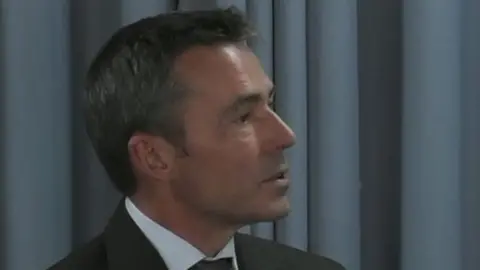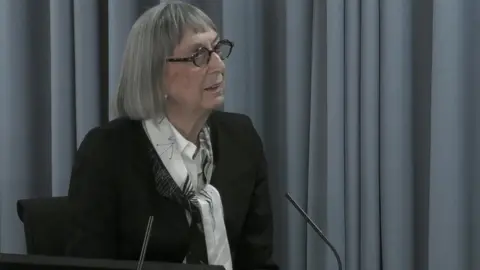Blood inquiry seeks answers at last
 BBC
BBCIt has been a long time coming - more than three decades to be precise.
At long last a full public inquiry into the infected blood scandal has started a process which will attempt to give victims and their families some answers.
Preliminary hearings last September set out the wide-ranging scope of the inquiry.
Now witnesses, including those infected and affected, have begun giving evidence.
In other countries where haemophiliacs and others became infected with HIV and hepatitis C through treatment by their health systems, politicians have been held to account and full compensation has been paid.
The UK has not moved in the same way to try to establish who was responsible and why the biggest treatment disaster in the history of the NHS was allowed to unfold.
A clotting agent, Factor VIII, was made from donated blood, some of which was infected and had come from paid foreign donors including prisoners. The big question is who at high levels of the NHS and government knew what and when.
Here in the UK there has been one privately funded inquiry with no powers to compel witnesses to attend.
In Scotland a judge-led inquiry under Lord Penrose reached limited conclusions.
Pain of patients
Now, under Sir Brian Langstaff, the new statutory UK-wide inquiry is under way which in his own words will be "independent of government, and frightened of no-one in the conclusions it may draw".
He is well aware of allegations of a cover-up in Whitehall with documents destroyed.
The opening day of evidence has served as a reminder of what was inflicted on patients who went to the NHS for treatment in good faith.
Derek Martindale, comforted by his son John sitting beside him, described being treated with blood products for his haemophilia in the mid-1980s but with no warning about the risks of contracting HIV and hepatitis C.
He asked for an HIV test and was told he was positive but was instructed not to tell anyone including his family and parents.
His brother, also a haemophiliac, later died with Aids and he spoke of the devastating impact on his parents.
At the end of Mr Martindale's evidence, people in the room stood and clapped.

Dr Carole Hill had a blood transfusion in 1987 but it wasn't until 2017 that she was told she had hepatitis C.
It transpired clinicians had carried out a test a few months earlier after she went in for another appointment.
Dr Hill said she was angry at the way she had been dealt with by the NHS in recent years.
She said better communication was required and more effort should be made to contact others who had blood transfusions and might have been infected with hepatitis C.
Perry Evans told the inquiry of his sadness at the impact on friends and family when he revealed his health condition.
He was told he was HIV positive in 1985 following treatment for his haemophilia but it transpired doctors had known several months before and not told him.
He spoke movingly about living with HIV at a time of scare stories and stigma.
Financial support
Victims and their campaigning groups, supported by the judge, have called for more generous financial support.
The Scottish government increased payouts after the Penrose inquiry but England, Wales and Northern Ireland have lagged behind.
Hours before the first inquiry, it was announced at Westminster that total annual funding would be increased from £46m to £75m for recipients in England.
The authorities in Wales and Northern Ireland are likely to follow but this is subject to further discussions.
Coming late in the day and without much detail, the government's financial announcement did not seem to impress many of the key participants.
There has been no change to unpopular means-testing and no solid demonstration that there can be parity of payments across the UK.
Compensation is another matter and could involve large sums of money.
Claims could hinge on the findings of this infected blood inquiry and the extent to which it finds fault at the heart of government.
